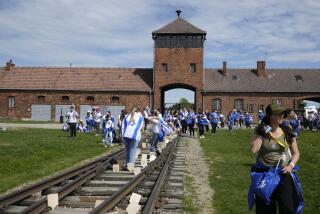Pope Urged to Remove Camp Cross
- Share via
WARSAW — On a day when Pope John Paul II appealed for religious unity and remembrance of all Polish victims of the Holocaust, a lingering dispute reignited Friday between Catholics and Jews over a cross erected for a papal Mass at Auschwitz 20 years ago.
Polish authorities had acted two weeks ago to avert controversy during the pontiff’s 13-day visit to his homeland by removing nearly 300 smaller crosses placed by Catholics at the death camp where Nazis slaughtered 1.3 million victims during World War II, the vast majority of them Jews.
But the 30-foot cross, erected for the pope’s 1979 visit, was left in place despite long-standing appeals for its removal. Jewish groups say the cross violates the memory of the Jews slain there.
One prominent Auschwitz survivor used his audience with the pontiff to protest.
“I would like to ask the pope to urge his people to take the last cross out of the camp so that Jews who come here can say their final prayer before dying,” Rabbi Menachem Joskowicz told the pontiff at a meeting with religious leaders at the Polish Parliament.
“I was in Auschwitz, which was a gate to heaven, and many people passed through that gate. Auschwitz is marked with people’s blood. It’s a sacred place,” the elderly rabbi told the pontiff in what he later described as a last wish as he prepares to retire.
John Paul made no audible response, but his spokesman and Polish Catholic leaders made clear that the towering crucifix will remain just outside the perimeter fence of the camp compound.
“The vast majority of people in this country want the papal cross to remain there in Auschwitz,” Vatican spokesman Joaquin Navarro-Valls said, referring to the more than 90% of Poland’s 39 million citizens who are Catholic.
The archbishop of the Warsaw diocese, Tadeusz Goclowski, also reiterated that “the position of the episcopate is clear--the pope’s cross will stay.”
The dispute, now elevated to the highest church levels, marred an otherwise historic day for the frail pontiff on what many expect to be his last visit home. Just before his meeting with the country’s religious leaders, he delivered the first papal address to a national parliament in church history.
In his speech, he urged Poles to tolerate differences of opinion and to work for a “European community of the spirit” as well as economic progress as a means of ensuring stability and social justice. As he spoke of the need for tolerance and reconciliation, Communist-era ruler Gen. Wojciech Jaruzelski, former Solidarity leader Lech Walesa, and President Aleksander Kwasniewski, a former Communist, sat in rare joint attendance and all applauded with vigor.
“The pope’s visit has a historical meaning that cannot be overestimated,” Prime Minister Jerzy Buzek said after John Paul’s address. “The pope is telling us what Poland should be like, what the politics should be like, and that human values should not be forgotten in everyday life.”
While most of Poland’s small Jewish community is united behind the appeal for removal of the cross from the death camp memorial, some complained that Joskowicz’s action was inappropriate in the context of a papal visit aimed at healing rifts among this nation’s peoples.
“This certainly makes the situation more difficult,” Rabbi Stanislaw Krajewski said of the prospects for negotiating a compromise that would allow some Catholic remembrance of the historic papal Mass at Auschwitz.
Catholic activists were more pointed.
“This demand is not acceptable. There are many Catholics here, and they have the right to their religious symbols,” said Marian Pilka, whose Christian National Union makes up part of the government.
The flare-up over the papal cross at Auschwitz came just ahead of a prayer ceremony led by the pope for Jews deported to Nazi death camps from the Warsaw Ghetto. While at the Umschlagplatz memorial marking the site of the deportations to Auschwitz and Birkenau, the pope spoke emotionally with the last surviving leader of the 1943 Warsaw Ghetto Uprising, Marek Edelman.
“I told the pope that here he can see the stones on which more than 400,000 men, women and children walked,” Edelman told reporters after the prayers for those sent to their deaths from the site, now marked by a black and gray marble memorial designed to resemble a railroad cattle car. “I told the pope that there is now a chance in Kosovo to see the birth of the Europe of the next century, and he agreed.”
More to Read
Sign up for Essential California
The most important California stories and recommendations in your inbox every morning.
You may occasionally receive promotional content from the Los Angeles Times.














